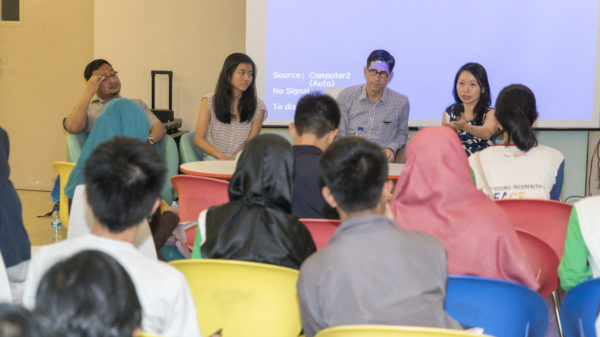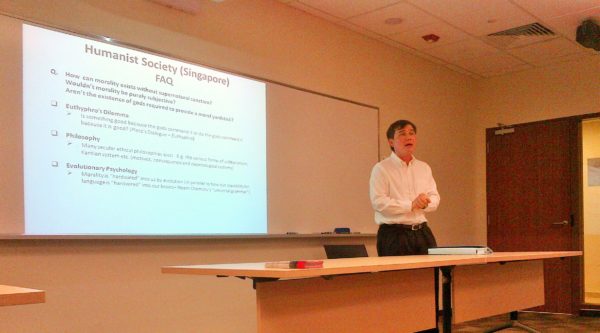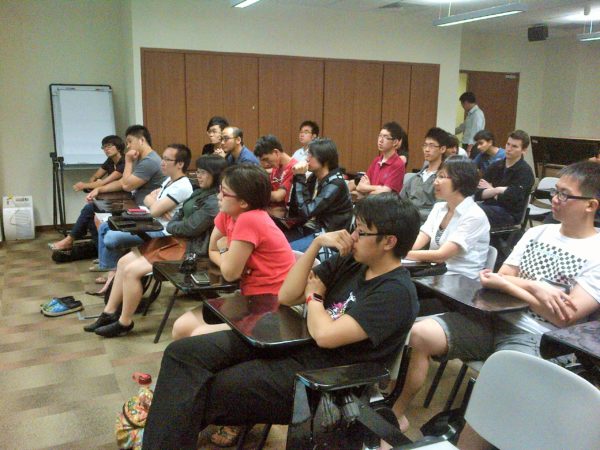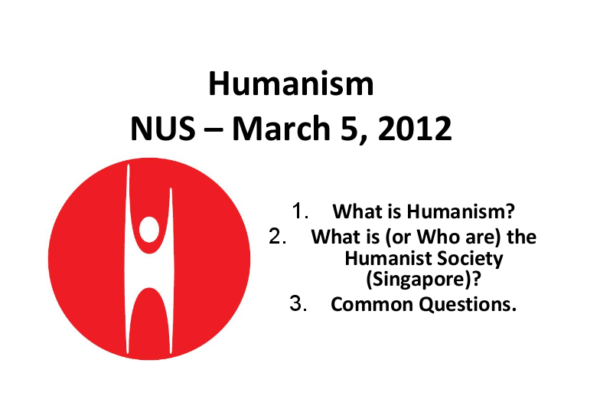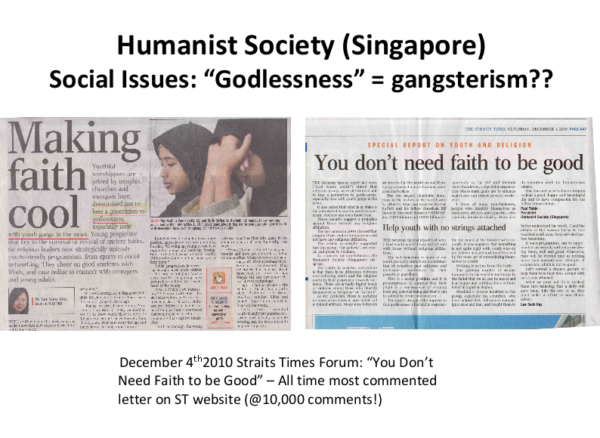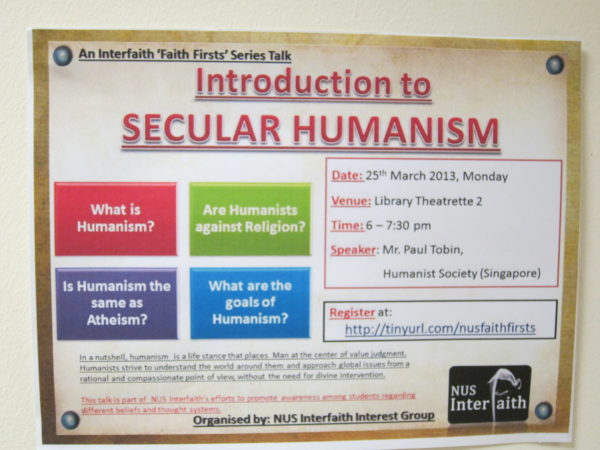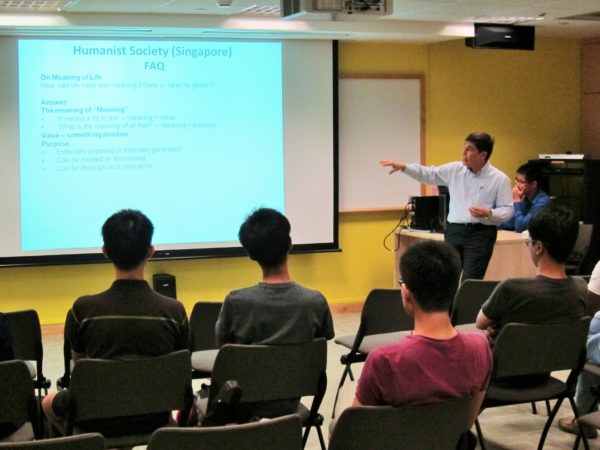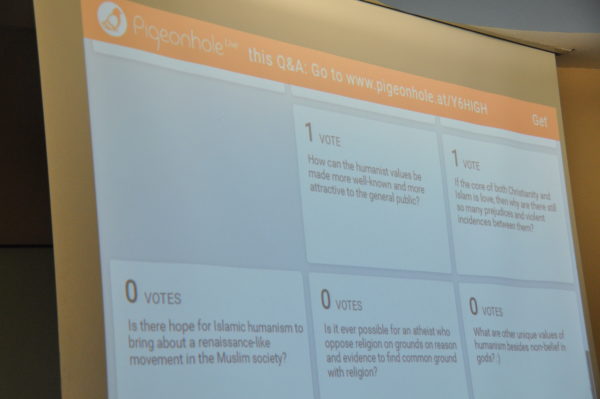The Humanist Society (Singapore) has taken part in dialogues organised by the National University of Singapore Interfaith student group. As of 2017, the Society has participated in three dialogues (2012, 2013 and 2017).
NUS Interfaith was founded in 2005 as a group of individuals from various religious and non-religious backgrounds. It aims to foster deeper understanding and appreciation through interfaith activities. Alongside the government-led Explorations into Faith (EiF) programme, NUS Interfaith was one of the first interfaith groups in Singapore to recognise the lack of non-religious representatives in the interfaith sphere.
NUS Interfaith first approached the Humanist Society in October 2011 while searching for non-religious voices into the ‘Faith First: Introduction to Religion” Dialogue Series. The series was part of an effort to promote awareness regarding diverse culture and belief systems to the NUS student population. NUS interfaith leaders Gwyneth and Wai Kit felt that the inter-faith scene lacks the humanist perspective.
The dialogue was eventually held on March 5, 2012, at Seminar Room 1 at Cinnamon College South Learn Lobe, within the NUS’ new University Town. Humanist Society representatives also met with students from the Facebook group “NUS students for Freethought” for dinner at the Koufu foodcourt.
Photos below: Our first interfaith dialogue in NUS
Then-President Paul Tobin gave a presentation, introducing our Society and the basics of humanism. Paul was supported by key members of the Society, including future President Mark Kwan and treasurer Eugene Tay. During the dialogue, we received many questions from the audience.
Photos below: Slides from Paul’s presentation
The following year, NUS Interfaith president Nur Nasuha invited the Humanist Society for a second presentation, also under the “Faith First: Introduction to Religion” Dialogue Series. NUS Interfaith believed that many students, both of religious or non-religious backgrounds, still do not know enough about secular humanism . The talk was held on March 18, 2013, at Library Thearette 1, NUS Central Library. The dialogue consisted of a 45-50 minute talk followed by a 30-35 minute QnA session:
Although the Humanist Society did not hold any interfaith dialogues in NUS from 2014-2016, interfaith efforts on other fronts increased. For example, we gave introductory lectures about humanism to EiF facilitators on 14 Sept 2014, and Aug 28, 2016. We also joined UnConference interfaith dialogues at NYGH. We also collaborated with a student group from Nanyang Technological University, called PATHS, which was working on a campaign on promoting interfaith dialogue among youth.
Through the efforts of humanist students at NUS Interfaith, the Humanist Society was invited to the third dialogue at NUS Yusof Ishak House, on February 8, 2017. The dialogue was well-organised and moderated by a faculty member, Dr. John van Wyhe. Our Society’s representative, Huifen, introduced the Humanist Society and engaged in a dialogue with interfaith activist Mohamed Imran Mohamed Taib.
The 2017 dialogue
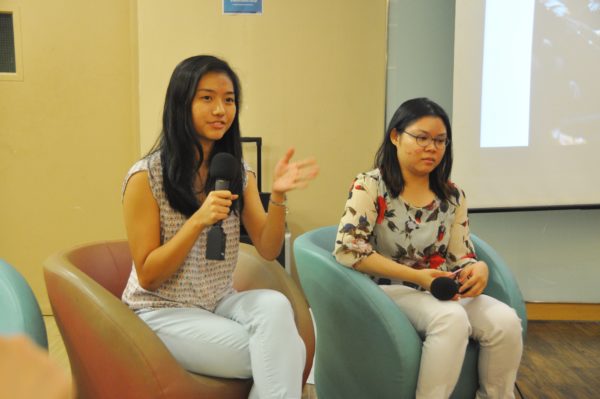
During the opening presentations, NUS student Ashley Toh (above), shared her experience as a former Christian and how the humanist community provided a support during her transition out of religion, which she described as the feeling that her world was “crumbling away”. She also responded to questions about a Tembusu College atheist film screening she co-organised with a Christian schoolmate last year.
Interfaith activist Mohamed Imran Mohamed Taib argued that both the religious and the non-religious are not monolithic groups and there is a need to appreciate the diversity within them. He shared briefly about his journey from a fundamentalist to a Muslim humanist, the false dichotomy between religion and reason, and how religious humanism (Christian and Islamic humanism) has contributed to the modern world today.
The QnA session was conducted in a very hi-tech manner. Audience members logged into a website and wrote questions which were featured on the screen. The moderator, Dr John van Wyhe, will then pick the questions to be asked. More than 20 questions were posted.
Dr John van Wyhe moderated the one-hour QnA session. Some of the opening questions include: 1) Why are non-believers considered more threatening than other religious believers? 2) The challenge that de facto “blasphemy” laws pose to the humanist movement.
On 1) Imran said that humanity always had a religion and it takes time for multiple layers of diversity to get accepted. Atheism is still quite new to the public eye and that is why people are still uncomfortable with it. Huifen, however, said that atheism has a very ancient past, with many philosophers even predating Christianity.
On 2) Huifen said that some of these laws could hurt the interfaith movement because people are not able to share thoughts candidly with each other. She felt it was better to let some disagreements be aired in public and resolved.
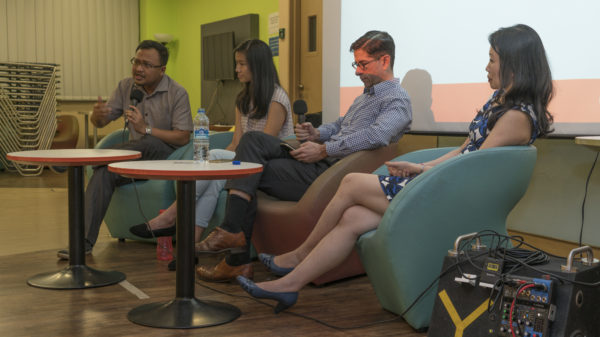
Imran (left) noted that even in free countries there are existing hate speech laws. However, he felt that laws based on religious offence can be problematic and used arbitrarily. There is also the danger of “hate spin” as mentioned by Cherian George, where groups of people deliberately take offence at perceived offences to mobilise public support for certain agendas.
The question on “the ideal state that humanists are trying to achieve” sparked a discussion over the limits of proselytisation. Ashley wanted a society where proselytisers respect boundaries, instead of aggressively trying to convert others all the time. Helping to clarify her thoughts, Dr van Wyhe described it as a society where humanists and secular people are recognised as equals, instead of being an “unoccupied square on the chess board.”
In response, Imran said that the right to proselytise is allowed under the Singapore Constitution, and to tell others that proselytisation is not allowed will be hard. In response, Huifen asked if that meant non-religious people have the right to speak their mind on religious matters too. Imran believes that non-religious people do have that right, pointing to the presence of books by Dawkins and Hitchens in bookstores.
Photos below: Imran (left) is a practising Muslim but he has spoken up regularly about the need to engage the non-religious in interfaith dialogue.
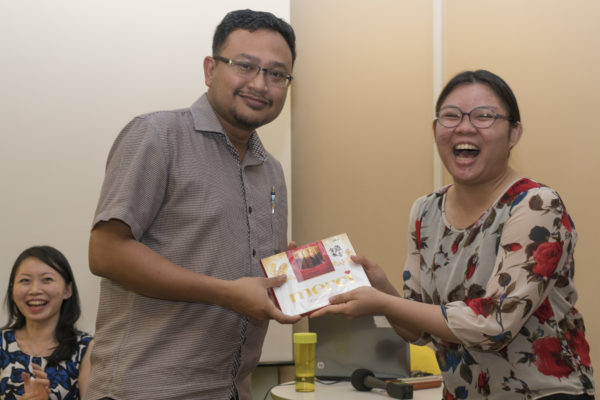
Many tougher questions followed from the audience. Some questions include 1) Any negative reactions towards Imran on identifying himself as a Muslim humanist 2) the point of interfaith dialogue, given the fact that some religions will always put down other religions, 3) On how humanists deal with suffering.
Imran said there is diversity within Islam and the moment one claims that there is only one Islam, the person is moving towards fundamentalism. On religions putting down others, Imran said that such teachings do exist but there are others who disagree with them. Religion is also always evolving, he added. On interfaith dialogues, Huifen said they are important because it gets people to meet and see each other. On the question of dealing with suffering, Huifen says she draws some insights from Buddhism, on how being more detached, objective and stoic can help you cope with the ups and downs of life.




